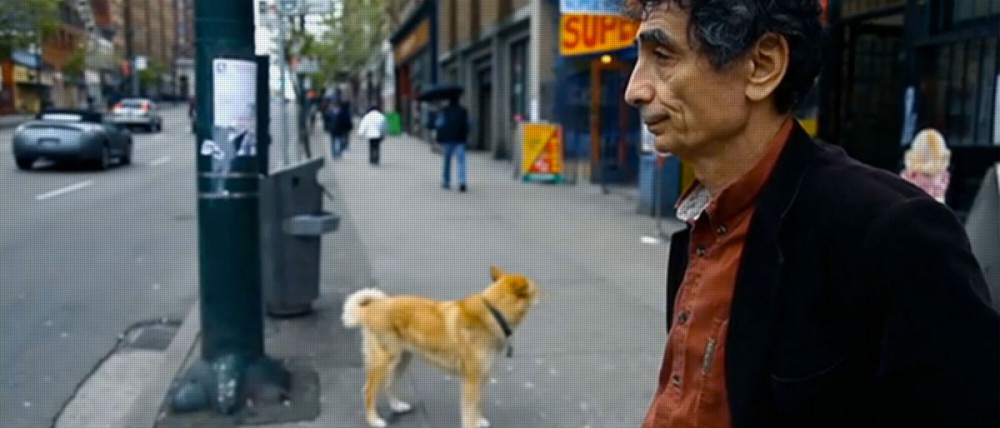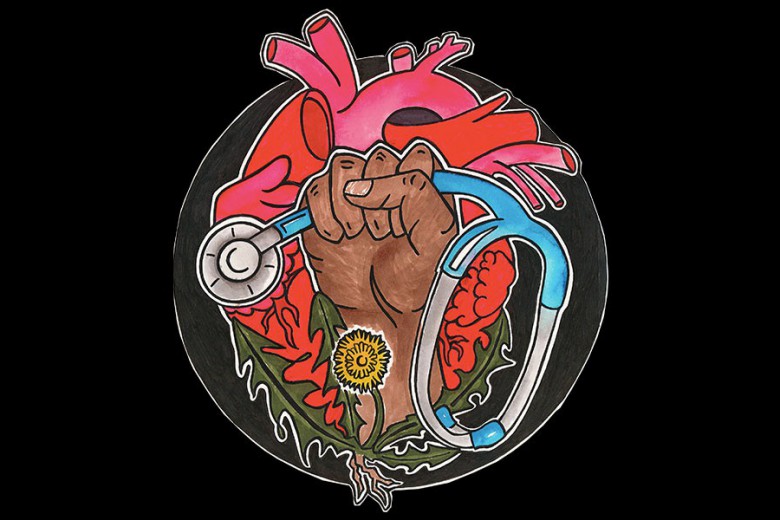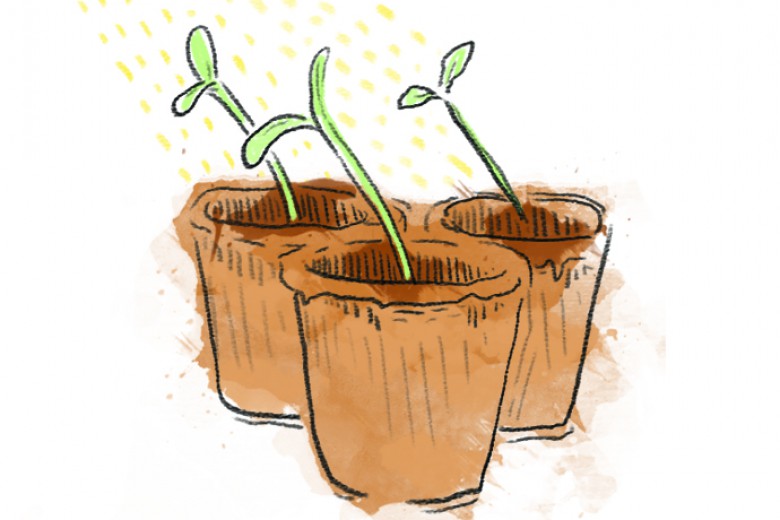
This is part two of Ryan Meili’s interview with Gabor Maté. Part one of the interview is HERE.
One of the things we’ve been hoping with Upstream is that human health can be easier to grasp than larger topics like environmental sustainability. Not that it’s that difficult to get across, just that a massive climatic shift compared to the suffering of someone exposed to environmental damage, or the improved health someone has when an environmental threat is removed, can reach people in a more personal way.
One of the things you do in your work that influenced the way I wrote A Healthy Society is use stories of patients and your own story to illustrate your points. That’s one of the approaches we’re taking with Upstream. Can you talk at all about why you choose to use that method?
For me, the stories I tell and the theoretical or scientific points I make are not separable. The science or the research I present is relevant only because the issues that the research illuminates make a difference to people. The truth of it shows up in the lives of actual human beings. When I write my books I want people to understand certain issues in a different way and one way to illustrate that is through the experience of other human beings that people can actually relate to.
The most gratifying feedback that I get for In the Realm of Hungry Ghosts is people who say “this book caused me to look at addiction in a different way, and I’ll never look at an addict with the same judgment and the same disdain as I used to. And not only that, I recognize that I have some of the same issues in myself.” That’s made most clear through the stories of individual people. That’s why I tell the stories.
Is that also why you share some of the stories of the addictive behaviours in your own life?
I’ve done that in all my books. That kind of candour, or self-revelation, was in my very first book, Scattered Minds, on Attention Deficit Disorder. I tell my own story because people have such shame around their dysfunctions. They’re afraid to own it themselves or talk about it to other people because they’re so critical of themselves.
And they think it’s only them.
They think it’s only them, and they’re alone with it. The essence of shame is that I’m alone with this miserable secret. For me, I have no shame about it, because my dysfunction is my dysfunction. I didn’t create it, I wasn’t born with it, it’s not who I am. It reflects certain coping patterns that I developed in response to my environment. Yeah, I’m responsible for it, but not because I’m a bad or shameful person, but because responsibility is what it means to be a mature human being. It’s not like I’m doing anything very courageous in sharing it, it’s just the truth about the human mind and the human ego, and I’m just an example of it. But it also allows other people to look at themselves without feeling that shame.
We are more than our behaviour.
Exactly, we’re not our behaviour, but it’s so easy to treat people as though they were their behaviour and to judge them.
You talk about a toxic culture, and you talk about mindfulness, about the curiosity to understand the roots of the behaviour of others, in order for us to live well and compassionately together. What is it about our culture today that impedes that sort of mindfulness and reflection to enable us to live well with others?
Two advertisements. One for the Globe and Mail, one for Air Canada. The Globe has a billboard saying “Never Stop Thinking.” That’s one part of the problem, that we’re totally caught up in thought. I’m not the first one to say so. Eckhart Tolle and others talk about the disease of thinking. “Never Stop Thinking,” that’s the whole problem. People don’t. Instead of being mindful and aware of what’s going on, we get caught up in our thoughts.
Then the Air Canada ad, which says, “The question is not where, but where next.”
We’re never in the present moment. We’re always externally and future oriented. So that constant stream of thought, filled with all kinds of garbage, and the constant need to keep going and never dwelling in the present, there are a million ways in which our society induces that kind of thinking pattern in all of us. Society undermines awareness. In a materialist society, the fundamental assumption is that only doing and having matters. And by that I don’t just mean a capitalist society. The communist society I grew up in in Hungary was just as materialist as this one.
The fundamental values we believe in are not the ones we profess, but the ones we act out. It doesn’t matter what the stated value is. You don’t know the values of a society by what it says about itself, you know the values of a society by how it actually behaves. So we can say that our values are freedom and justice, but how do you put that together with the actual reality? If that were true, why are Saskatchewan’s jails filled so disproportionately with Aboriginal people? Our actual value is acquisition: the control, acquisition, and disposition of material goods. The more you can produce, the more you can control, the more you can acquire, the more successful you are in the eyes of the society. These are the ideas, the entrepreneurs, the rich ones, the ruthless accumulators of wealth, like Donald Trump, who is a TV hero. Not human values, but material values that objectify everybody.
Everyone’s a product.
Everyone’s a product, everyone’s related to a product, which is what advertising is so successful at exploiting.
Earlier on as you started to talk about your next project, a related book came to mind: The Spirit Level by Richard Wilkinson and Kate Pickett, that talks about the ways in which greater levels of inequality worsen health outcomes. What are your thoughts on why that might be? What is it about inequality that would actually worsen physical and mental health?
You make the point in your book that the health effects, even though they hurt the poor more, the people at the top also have worse health when there’s greater inequality. I think there are a whole lot of reasons. Inequality is not the only point. Control is the point. Who’s in charge? The people in charge are going to be a lot healthier than the people who aren’t in charge. That’s just the way it is. Lack of control, you know the British Whitehall study on heart disease, where a major factor was how much control people had over their work and life. Inequality is not just about what you have, that’s a marker for our capacity to control.
It’s as much about status as it is a material good.
Yes, but it also reflects genuine relationships of production. The people who are in charge have more control. One of the biggest factors that triggers stress in people is loss of control. In a society where there’s big inequality, the people at the top are more driven, they’re more compulsive, it matters to them more how much they’re in control, and therefore they’re less free themselves. They’re more defensive. What’s the deep insecurity in the need to get more and more?
The people at the top represent the character of the society in which they rise, and perhaps, being the extreme of that, embody its most pathological character traits.
If you look at Conrad Black, I talk about him in Hungry Ghosts, that’s one unhealthy character, in my view. He’s very successful, but my God, how would you like to be inside his head, where it’s all about enemies and control and who’s going to bring him down – not to mention his toxic disdain for everybody who challenges him.
Speaking of health, you’re a physician, and one who has worked extensively with marginalized populations. One of the things I have some tension about, doing upstream framing work and advocacy, is I’m not on the front lines. I was in clinic today, but I’m away from patient care very often to do this work. Are you still practicing?
I was at OnSite, which is run by the Portland Hotel Society, it’s the detox above InSite [Vancouver’s safe injection facility]. I worked at another program where we give IV antibiotics to addicted people who cannot be treated in hospital. Say you have osteomyelitis, but you’re a drug addict and you need to be using, so you won’t stay in the hospital. It’s a program in the community, staffed by nurses, where doctors come in daily and drug users get their IV antibiotics to cure their osteomyelitis, but they’re in the community and can go and use if they need to. You get people completing their IV treatment that otherwise wouldn’t.
Saving their hips or legs or hearts, whatever was affected.
And saving money. I did that work and onsite work. I haven’t renewed my license now for three years.
I did medical practice for 34 years. Today I spoke to 450 people (at the Saskatoon Tribal Council hosted event), the other day I was in Yakima, Washington talking to 500 people, last week I was in Whitehorse talking to 800 people, before that I was in Yellowknife talking to 800 people. So I’m not complaining. I’m not feeling guilty, because – well, sometimes I do, sometime I miss it, I miss the contact – but I get a lot of contact this way too and I like what I do.
For you, it’s a question of where do you want to have the impact. The fact that you are a practicing physician, and you’re an advocate, gives you a lot of credibility. If you didn’t take on the advocacy stuff, you might see four or five more patients a day, but you wouldn’t be communicating with a lot of others.
I take some solace in the Rudolf Virchow quote, “Politics is medicine on a larger scale.” I think it’s very true, and I’m very much driven to do this kind of work because of the idea of the social determinants of health. I also think that understanding is fortified by continued patient contact. And the fact that, working where I work, as in the places you did, you see so clearly the way that those determinants play out in the lives of individuals. That response to the lives of the people you were seeing, was that a major driver in doing the writing and advocacy that you do?
I used to be an activist when I was a university student back in the ’60s. I was part of the Vietnam War generation. I was quite radicalized by the war, and had a social view when I went into medicine. When I applied to medicine, the dean of admission interviewed me, and he knew of my background as an undergraduate. He said to me “Medicine is such an establishment, elite profession, why would you want to join it?” And I said – I just made it up on the spot– I said, I was in radical politics because I wanted to create a better society, I wanted to help people, I wanted to ease the burden of suffering in the world, and that’s precisely what I see the role of the medical profession as being. He really thought this was significant and that’s how I got into medical school. In other words, it wasn’t just my medical practice that convinced me, I already had that perspective.
I knew I wanted to do medicine when I started to get involved in activism. I had a similar trajectory, coming through protest movements, the Seattle generation, that pre-9/11 movement that was very strong, and then I directed more, during medicine, into politics around global health, Aboriginal health, as well as Medicare.
Coming back to toxic culture, I’m very interested in the solutions available to us, if we have a culture that’s creating good health, what’s the root to good health, what does a political culture look like that would produce good health outcomes?
That’s going to be the problem for me, because I don’t think the system can be reformed. No ruling class has ever reformed itself out of power. They just don’t. I can suggest things that can happen now, ways people can protect themselves. Activism is one way to protect yourself, as long as you don’t get consumed by it. If you are active, you join with others, then you don’t get so powerless.
In terms of the system, I’m not going to decide a new one. Utopias don’t work. The system’s not going to change because I write a book, because I make some suggestions. Sometimes you just have to describe the problem.
That doesn’t mean that your work isn’t important in terms of upstream policies that are actually achievable. It’s really important to advocate for that. Even if you don’t achieve every one of your goals, it’s essential information for people. They need to know that the way things are is not a given, that this is not the way God designed the earth, that we can think differently. That’s really important, whether or not your policy aims are practically achieved.
As much as Upstream is a very ambitious undertaking, an effort to change the frame of political discussions to focus on health, it’s also just about creating space for better decisions that improve people’s lives.
For sure. It’s not necessary to overthrow capitalism to have some better policies. It’s not a given that we have to be as stupid as we are.


_780_520_90_s_c1.jpg)



